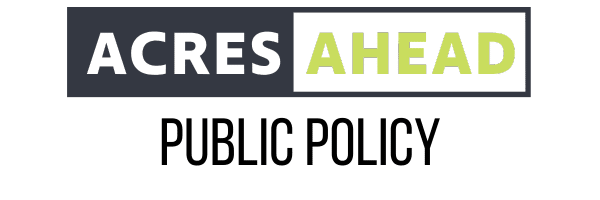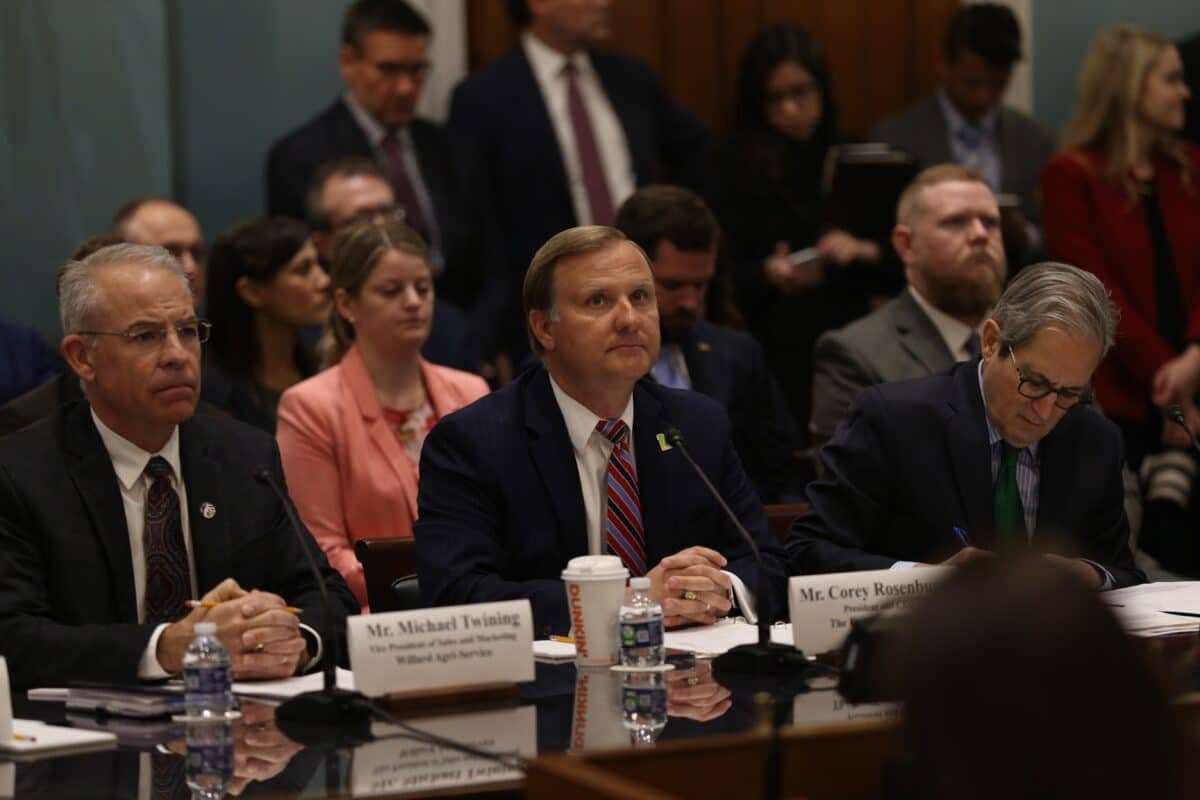Why can’t I access this file?
Possible reasons you cannot access this file:
- Your membership has expired.
- The file is restricted to certain users.
If you are seeing this message in error, please contact us.

Arlington, VA – The Fertilizer Institute (TFI) today praised Farm Bill frameworks released by House Committee on Agriculture Chairman Congressman Glenn “GT” Thompson (R-PA-15) and Senate Committee on Agriculture, Nutrition, and Forestry Chairwoman Debbie Stabenow (D-MI).
“TFI is pleased to see so many of the industry’s priorities around conservation and nutrient stewardship included in the framework shared by Chairwoman Stabenow and Chairman Thompson,” said TFI President and CEO Corey Rosenbusch. “Nutrient stewardship is a cornerstone of the industry and we spend significant time encouraging grower adoption of these practices. The framework laid out yesterday will help that a great deal.”
Two specific priorities mentioned by Rosenbusch include recognizing Certified Crop Advisors (CCAs) as Technical Service Providers (TSPs) permitted to write and approve nutrient stewardship plans, and a pathway for enhanced efficiency fertilizers to be eligible for the Environmental Quality Incentives Program (EQIP).
“We know we still have a long way to go until we have a passed Farm Bill, but this framework is a big step forward,” Rosenbusch concluded. “We look forward to working with Congress on ensuring programs that help increase grower adoption of practices that keep fertilizer on fields and food on our tables remain included in the Farm Bill, as well as further initiatives aimed at strengthening the domestic fertilizer supply to safeguard our nation’s food security.”
###

Possible reasons you cannot access this file:
If you are seeing this message in error, please contact us.

On March 15, 2024, EPA released the draft risk evaluation under the Toxic Substances Control Act (TSCA) for formaldehyde for public comment and peer review. The EPA preliminarily determined that formaldehyde poses an unreasonable risk in 3 conditions of use (COU) related to fertilizer. TFI has developed a one-pager on formaldehyde. Please reach out to Reagan with any questions or to get involved in TFI’s response to this evaluation.

Arlington, VA – The Fertilizer Institute (TFI) today praised the U.S. Senate for introducing bipartisan legislation to include phosphate and potash on the final list of critical minerals of the Department of the Interior. Introduced by Senators Sherrod Brown (D-OH), Thom Tills (R-NC), Tammy Baldwin (D-WI), Roger Marshall (R-KS), Pete Ricketts (R-NE), and Rick Scott (R-FL), the legislation will recognize the importance of ensuring a strong and sustainable domestic fertilizer supply for American farmers.
“We thank Senators Brown, Tillis, Baldwin, Marshall, Ricketts, and Scott for coming together and introducing this important legislation,” said TFI President and CEO Corey Rosenbusch. “The majority of the world’s phosphate and potash resources are concentrated in only a few countries, leaving them open to supply chain vulnerabilities and geopolitical instability. The events of the past few years have shown us that food security is national security and now is the time to change how we talk about these vital resources.”
The United States imports roughly 95% of its potash needs, the bulk of which come from Canada. Only 14 countries in the world produce potash, with Belarus and Russia comprising nearly 40% of global production. Regarding phosphate, China accounts for over 40% of global production.
“It is vital that we, as a country, take proactive steps to secure our own agricultural future by recognizing the role these minerals play in putting food on our tables,” Rosenbusch continued. “Without these two minerals, modern agricultural systems would crumble and the ability to feed our growing population would be nearly impossible.”
The U.S. has both phosphate and potash production, but expanding mines and opening new ones is a costly and time-consuming process measured in years and in the tens of millions of dollars for permitting alone. Being listed as critical minerals would not exclude these projects from environmental reviews, but would assign a single permitting agency to be responsible and streamline the process.
“By adding phosphate and potash to the Critical Minerals list, we can take a significant stride towards securing our own future and sending the clear message that safeguarding our nation’s food supply is not only an economic imperative, but a strategic priority that ensures our well-being,” Rosenbusch concluded. “We look forward to working with Congress to support this vital legislation.”
###

Chemistry is essential to food, clothing, shelter, healthcare, and energy. Chemistry provides new solutions to challenges, including cleaner air, water, and energy consumption. Without chemistry, the smartphones that keep us all connected would not exist. And as it pertains to food, we would be without the roughly 50% of crop yields that are directly attributable to chemical fertilizers. Hence, chemistry’s importance to farmers and food security. Critical chemical infrastructure facilities are essential to our quality of life, and we should ensure they have appropriate safeguards to minimize security threats.
The Chemical Facility Anti-Terrorism Standards (CFATS) program enhances security at critical chemical infrastructure facilities. In 2007, Congress and the Department of Homeland Security’s (DHS) Cybersecurity & Infrastructure Security Agency (CISA) created the CFATS program. Since then, CFATS has provided essential guidance to the private sector to identify and ensure certain facilities are taking the appropriate security measures to reduce the risk that chemicals can be weaponized by terrorists.
All Americans benefit from CFATS, yet the program, which is broadly supported by the regulated community, expired on July 27th. Congress must act quickly to reauthorize this critical security program.
On July 12th, the House Committee on Homeland Security approved H.R. 4470, which reauthorizes CFATS for two years. The bill received an overwhelming 30-0 vote in its favor. The House then passed the legislation resoundingly, only receiving a single vote against its reauthorization. Disappointingly, the Senate was unable to reach an agreement prior to the August recess and the program expired.
The CFATS program has been supported by the industry since its creation in 2007. TFI has encouraged its members to continue complying with CFATS regulations as if the program was still being enforced. Additionally, ResponsibleAg, an industry-led initiative committed to helping agribusinesses properly store and handle farm input supplies and to ensure they are compliant with environmental, health, safety and security regulations, has also communicated about the importance of continuing to operate within the compliance of the expired CFATS program regulations.
While facilities can maintain much of the CFATS regulatory compliance in the face of expiration, some critical tools and resources are no longer available to facilities. For example, access to the Chemical Security Assessment Tool has been removed, the Cybersecurity and Infrastructure Security Agency (CISA) can no longer perform inspections or provide CFATS compliance assistance, nor can it accept new names for background vetting pursuant to the CFATS Personnel Surety Program.
TFI will continue working closely with the CFATS coalition, Department of Homeland Security, and Congress to ensure this critical program is reauthorized as quickly as possible to ensure our nation’s chemical facilities have the proper tools and resources to remain secure.

Arlington, VA – The Fertilizer Institute (TFI) president and CEO Corey Rosenbusch today issued the below statement following the U.S. Supreme Court’s decision in Sackett vs. Environmental Protection Agency, a case central to Waters of the United States (WOTUS) policy.
“The Fertilizer Institute welcomes the Supreme Court’s decision in Sackett v. EPA. The decision, which strikes down the “significant nexus” test in determining what is considered a Waters of the United States, is a win for agriculture. While regulatory interpretation from the EPA will take time, the SCOTUS decision is a great first step in providing the clarity that the fertilizer industry needs for long-term planning and capital investments that will allow us to continue providing the critical nutrients that feed the crops that feed our communities.”
###
The Fertilizer Institute (TFI) is the leading voice of the nation’s fertilizer industry. Tracing its roots back to 1883, TFI’s membership includes fertilizer producers, wholesalers, retailers and trading firms. TFI’s full-time staff, based in Washington, D.C., serves its members through legislative, educational, technical, economic information and public communication programs. Find more information about TFI online at TFI.org and follow us on Twitter at @Fertilizer_Inst. Learn more about TFI’s nutrient stewardship initiatives at nutrientstewardship.org and on Twitter at @4rnutrients.

The Advancing Cutting Edge (ACE) Agriculture Act (S.834) was introduced in the US Senate by Senators Michael Bennet (D-CO) and Roger Marshall (R-KS) on March 16, 2023. The legislation will establish a new program within the U.S. Department of Agriculture (USDA) called the ACE Agriculture Research and Extension Program, which would provide grants to universities, research institutions, and other organizations to conduct research and develop new technologies and practices in areas such as precision agriculture, plant and animal breeding, soil health, and water management.
The ACE Agriculture Act aims to promote innovation in American agriculture and help farmers and ranchers stay competitive in a rapidly changing global marketplace. By investing in research and development, the bill seeks to support adopting cutting-edge technologies and practices that can increase productivity, reduce costs, and improve sustainability in the agriculture sector, including research related to 4R Nutrient Stewardship.
The 4R Nutrient Stewardship, also known as the 4Rs, is an approach to fertilizer management that involves using the right source of fertilizer, at the right rate, at the right time, and in the right place. This approach aims to optimize nutrient use efficiency and minimize nutrient losses to the environment, promoting sustainable agricultural practices. Studies have shown that using the 4R method has proven benefits, including reducing nutrient losses and increasing yields.
The 4R Research Fund was established to develop sustainability indicators and environmental impact data for the implementation of 4R Nutrient Stewardship across North America. The fund offers essential resources to measure and document the economic, social, and environmental impacts of 4R Nutrient Stewardship.
4R Research encompasses a broad range of studies related to nutrient management, including research on fertilizer formulation and application, soil health, crop yields, and environmental impacts. The 4R Research website, https://www.4rresearch.org/us-funded-projects/, lists industry and government-funded research projects related to 4R Nutrient Stewardship, which can be a valuable resource for individuals interested in learning more about current research in this area.
The most important part of all research is finding ways it can be practically applied and publicly promoted. The 4R Advocates program is an initiative by The Fertilizer Institute (TFI) to recognize individuals and retailers who implement 4R Nutrient Stewardship concepts on their farms. Each year, some of the top 4R farmers and retailers in the U.S. are selected by TFI as annual 4R Advocates. These farms actively demonstrate the 4R Nutrient Stewardship concept, which is shown to maximize crop yields while minimizing nutrient loss to the environment and improving soil health.
The ACE Agriculture Act is related to 4R Research and 4R Nutrient Stewardship. It seeks to fund research on sustainable agricultural practices, including research related to 4R Nutrient Stewardship, to support the long-term sustainability and productivity of the U.S. agricultural sector. As part of its efforts to support sustainable agriculture, the ACE Agriculture Act includes funding for research on 4R Nutrient Stewardship practices, including plant and soil health, precision agriculture, and water management programs aimed at reducing the environmental impact of agriculture activities.
In addition to funding research, the ACE Agriculture Research and Extension Program would provide funding for extension services to help farmers and ranchers adopt new technologies and practices in their operations. This could include training and education on 4R Nutrient Stewardship practices, as well as other sustainable agriculture practices.
The ACE Agriculture Act and the 4R nutrient stewardship framework both aim to promote sustainable agriculture practices that can improve productivity, reduce costs, and improve environmental outcomes in the agriculture sector. The research funded by the ACE Agriculture Research and Extension Program could include studies on the 4R nutrient stewardship framework and its application in different agricultural systems. This could consist of adopting 4R practices by providing funding for research and development in areas such as precision agriculture, soil health, and water management. While the ACE Act will increase funding for new research and applied agricultural science, organizations like TFI are critical in sharing the importance and impact of these efforts with the public.

Arlington, VA – The Fertilizer Institute (TFI) President and CEO Corey Rosenbusch today praised Congress for introducing the Advancing Cutting Edge (ACE) Agriculture Act. Introduced in the Senate on March 16th by Senators Michael Bennet (D-CO) and Roger Marshall (R-KS), and in the House of Representatives yesterday by Representatives Jimmy Panetta (D-CA-19) and Randy Feenstra (R-IA-4), the ACE Agriculture Act will help farmers by focusing United States Department of Agriculture (USDA) research on critical areas such as soil health and increasing crop yields.
“With our global population expected to hit 10 billion people by 2050, farmers are constantly being asked to do more with less, while also being good environmental stewards by taking care of the land that takes care of us,” Rosenbusch said. “The fertilizer industry puts a strong focus on research and the farmer adoption of 4R Nutrient Stewardship practices and other methods that improve soil health, encourage the responsible and efficient use of fertilizer, increase crop yields, and minimize impacts to the environment, and welcomes additional government research into these areas.”
The fertilizer industry has long supported agricultural research through the 4R Research Fund, as well as independent research that has focused on multiple crops, geographic locations, and methods to show farmers the beneficial outcomes of new technologies and farming practices. In addition to industry efforts through the 4R Research Fund, TFI is a year and a half into a nationwide goal of having 70 million US farming acres under 4R nutrient stewardship management by 2030.
“We’ve done the research and know that these practices have both environmental and economically beneficial outcomes associated with their implementation,” Rosenbusch continued. “But these practices are not one-size fits all and not only is each farm different, but each acre on each farm is unique and growers need to feel confident when implementing new practices. We believe more research directly from the USDA on these critical issues can only help farmers continue growing that confidence and lead to wider farmer adoption.”
In its recently released Public Policy Priorities for 2023-2024, TFI has a direct focus on supporting the federal funding of 4R research and the inclusion of 4Rs in state plans to minimize nutrient loss from non-point sources.
“At the end of the day, food security is national security,” Rosenbusch concluded. “Fertilizer availability and smart application drive better yields, which in turn promote greater individual and collective health, wealth, and well-being. TFI strongly supports the ACE Agriculture Act and other legislation that will help American agriculture continue feeding the world in a sustainable way.”
###
The Fertilizer Institute (TFI) is the leading voice of the nation’s fertilizer industry. Tracing its roots back to 1883, TFI’s membership includes fertilizer producers, wholesalers, retailers and trading firms. TFI’s full-time staff, based in Washington, D.C., serves its members through legislative, educational, technical, economic information and public communication programs. Find more information about TFI online at TFI.org and follow us on Twitter at @Fertilizer_Inst. Learn more about TFI’s nutrient stewardship initiatives at nutrientstewardship.org and on Twitter at @4rnutrients.

Arlington, VA – The Fertilizer Institute (TFI) President and CEO Corey Rosenbusch today praised Congress for introducing the Plant Biostimulant Act. Introduced by Representatives Jimmy Panetta (D-CA-19) and Jim Baird (R-IN-4) and Senators Alex Padilla (D-CA) and Mike Braun (R-IN), the Plant Biostimulant Act will support the adoption of biostimulants by farmers and provide clarity to the emerging marketplace.
“Biostimulants are a relatively new innovation in agriculture,” Rosenbusch explained. “There is great potential in these products, but as with any new technology there are hurdles.”
Among the biggest of the hurdles mentioned by TFI’s Rosenbusch are the lack of a clear and consistent definition for “biostimulant” and the fact that there is no uniform framework to regulate them as plant nutrition products.
“The lack of a regulatory framework inhibits research and puts the US behind Europe in product development,” Rosenbusch said. “Other countries are regulating biostimulants through a fertilizer lens and finding success. We are hitting a roadblock right out of the gate and need those guardrails to foster innovation, research, testing, and ultimately a path to market for these products.”
Biostimulants have the potential to enhance the existing environmental stewardship of growers and compliment 4R fertilizer practices.
“When we talk nutrient management, we are talking about minimizing losses to the environment, water quality, air quality, soil health, and all the other things important to the conservation and environmental communities. Biostimulants support environmental stewardship by improving the efficiencies of fertilizer application and soil health while also increasing crop yields,” Rosenbusch concluded. “With a growing population, demand for agricultural production continues to increase. The fertilizer industry is innovating to meet those demands and legislation like the Plant Biostimulant Act will allow that innovation to reach growers.”
###
The Fertilizer Institute (TFI) is the leading voice of the nation’s fertilizer industry. Tracing its roots back to 1883, TFI’s membership includes fertilizer producers, wholesalers, retailers and trading firms. TFI’s full-time staff, based in Washington, D.C., serves its members through legislative, educational, technical, economic information and public communication programs. Find more information about TFI online at TFI.org and follow us on Twitter at @Fertilizer_Inst. Learn more about TFI’s nutrient stewardship initiatives at nutrientstewardship.org and on Twitter at @4rnutrients.

“If there is one thing you take away from my comments, it is this: Fertilizer is a globally traded commodity, subject to international pressures and geopolitical events.” This emphatic statement was made by TFI president and CEO Corey Rosenbusch while testifying at a House Committee on Agriculture hearing on February 28th. The hearing, titled “Uncertainty, Inflation, Regulations: Challenges for American Agriculture,” lasted nearly 5 hours and focused heavily on market dynamics of the fertilizer industry and pressures currently facing the U.S. agricultural sector at large.
When asked what Congress can do to help ensure farmers continue to have access to a stable source of fertilizers, Rosenbusch pointed to the need for regulatory certainty as many factors affecting the fertilizer market are out of the control of Congress. Those factors include the international pressures and geopolitical events mentioned by Corey early in his testimony.
Prime examples of those factors are sanctions on Belarus, which supplies 20% of the world’s potash supply; China, which is a major exporter of fertilizers, but has imposed restrictions on fertilizer exports; and Russia, which has historically provided 20% of global fertilizer supplies as the world’s largest fertilizer exporter. “Domestic production of fertilizer accounts for only 7% of global production and 90% of all fertilizer usage happens outside of the United States,” Rosenbusch explained. “Geopolitical events have been the biggest disrupter to fertilizer markets in recent years.”
Energy policy is another area where Congress can provide relief by ensuring that fertilizer producers have an abundant and affordable supply of natural gas. Rosenbusch highlighted the fact that when Russia restricted much of Europe’s natural gas supply last year, approximately 70% of European nitrogen fertilizer production shutdown, leading to additionally market volatility.
The market news wasn’t all bad, though. Rosenbusch pointed out that in recent months fertilizer input costs have come down. European nitrogen plants have restarted as natural gas prices have moderated following a mild winter and China has been slowly exporting more fertilizer.
After providing the above examples of factors influencing fertilizer markets that are out of the control of Congress, Rosenbusch circled back to the regulatory certainty needed by the industry that Congress can provide, explaining that fertilizer production facilities are capital intensive and typically cost between $1-$4 billion to build. Rosenbusch also cited listing potash and phosphate as critical minerals, permitting reform to streamline long delayed fertilizer projects, focusing on USDA conservation programs that empower agronomists and certified crop advisors to help farmers with nutrient management, and a focus on supply chain bottlenecks through improving rail service and promoting driver recruitment and retention.
Click HERE to view the full recording of the House Committee on Agriculture hearing.